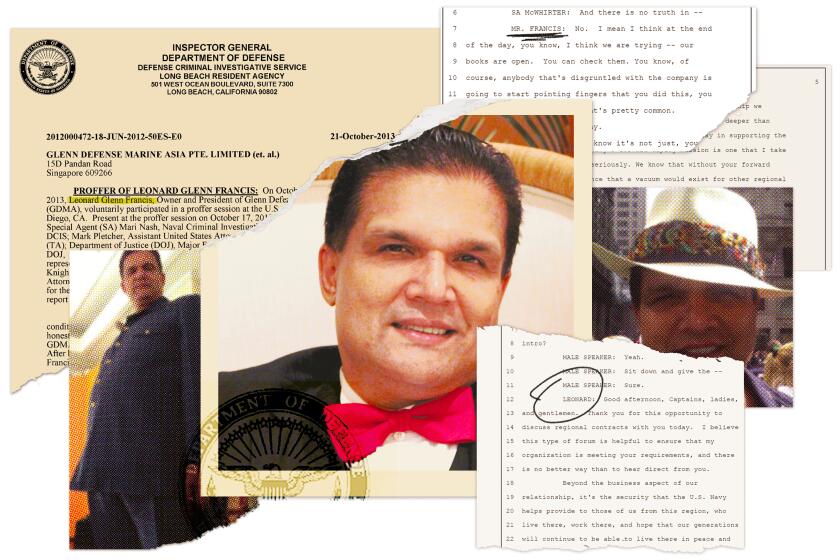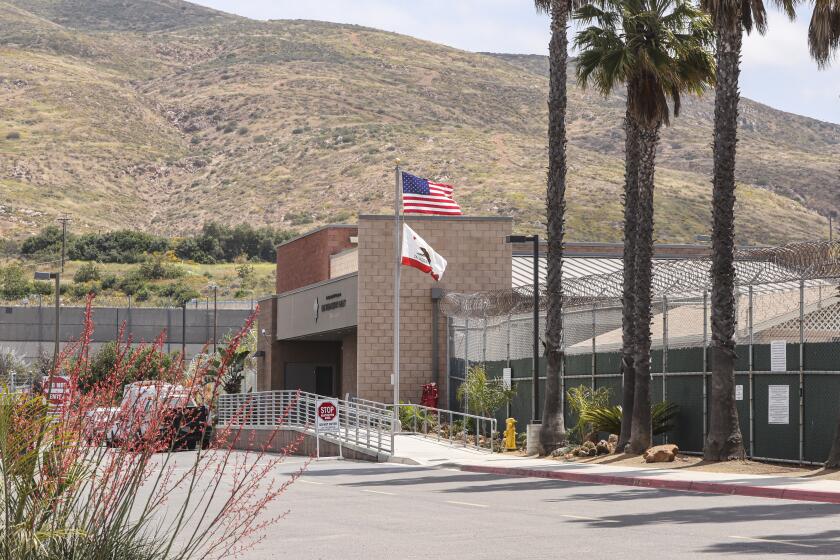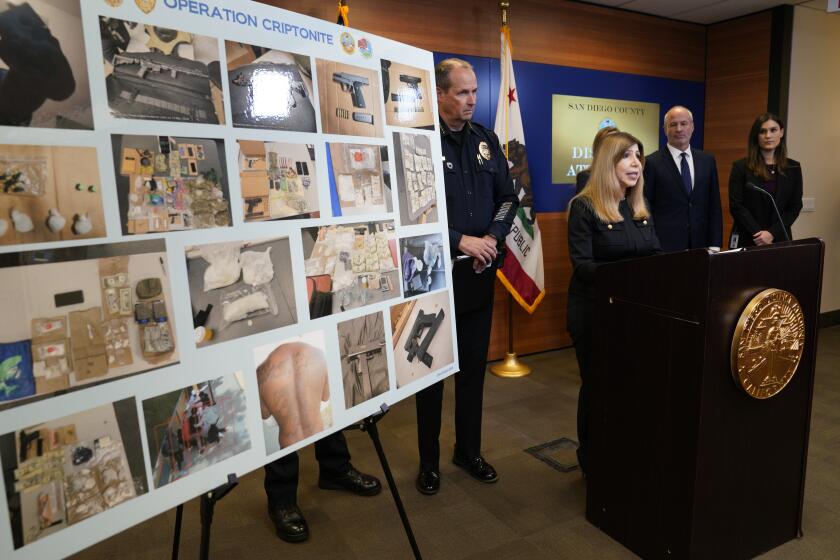California law that lets cops buy ‘off-roster’ guns expanded to include more in law enforcement
One day in February, agents from the federal Bureau of Alcohol, Tobacco, Firearms and Explosives searched a home on a quiet street in the Los Angeles County city of Sierra Madre, and left with enough guns to fill two trucks.
The home was owned by Pasadena police Lt. Vasken Gourdikian, the department’s spokesman and former top aide to the chief. Federal records show investigators seized 57 firearms from the home, including pistols, rifles and shotguns.
The search also led to a letter six weeks later from the head of the ATF field office to police agencies across California, warning them of an “emerging problem” of police officers who may be illegally selling guns.
The search and letter have shined a light on a little-known provision of the state’s gun control measures that allows peace officers to buy weapons the general public can’t.
California maintains a list of handguns that can be legally purchased by the public. But the law establishing that list also includes an exemption that allows some members of law enforcement — police officers and sheriff’s deputies, for example — to buy “off-roster” guns.
The Sierra Madre search came five months after Gov. Jerry Brown signed an Assembly bill that widely expanded the number of peace officers eligible to purchase weapons that are otherwise unavailable to the public.
The legislation, AB2165, specified sworn peace officers in 19 different agencies qualified for the off-roster exemption. It said that if they passed a three-day basic firearms training course they were covered under the exemption. One gun control advocate said the bill made tens of thousands of peace officers potentially eligible to buy off-roster weapons.
The legislation includes state peace officers in the Parks and Recreation Department, Alcoholic Beverage Control, Department of Motor Vehicles, Department of State Hospitals, and state university and community college systems. It also includes rangers with water districts, county welfare fraud investigators and probation officers.
The bill, sponsored by Assemblyman Rob Bonta, D-Oakland, does tighten one part of the exemption: It limits the newly exempt officers to reselling the off-roster guns to other law enforcement members only.
That might not be all that it seems.
Brandon Combs, executive director of The Calguns Foundation, a group that advocates for gun owners and gun rights, said the law puts the onus on licensed firearms dealers — who have to broker any sale through a private-party transfer — to verify that the buyer and seller are both in law enforcement and can make the sale.
But Combs said there is no database or any other method available for dealers to verify that information.
“The state doesn’t give any mechanism for dealers to understand … are you subjected to this exemption, are you bound to this limitation,” he said.
So if a person on the latest list decided to break the rules and sell the weapon to someone who wasn’t in law enforcement, the buyer could simply claim to be an employee of one of the many groups that now has permission from the state to buy them — and there’s no way for the dealer to check.
Combs said some dealers, concerned they could lose their license or face criminal charges if they unwittingly facilitate an illegal sale, have resorted to obtaining signed declarations promising no laws are being broken from anyone who wants to transfer an off-roster gun.
Opponents of the legislation were concerned about expanding the exemption and questioned whether the state had the ability to enforce the provision limiting resales to other law enforcement officers, said Griffin Dix, co-chairman of the Oakland chapter of the Brady Campaign to Prevent Gun Violence.
“A lot of us in the gun violence prevention camp did not like this,” Dix said. “It expanded that exemption for law enforcement to too many people, and for government employees who were really nor primarily police officers.”
Since the bill became law, Dix said he has been told the state Bureau of Firearms has said it has the ability to track the sales.
That could not be confirmed. The state attorney general’s press office would not answer a question about whether the state can track such sales. In a statement, it said it could “not provide legal analysis or legal opinion.”
Bonta’s legislation was also sponsored by three large law enforcement groups — the California Statewide Law Enforcement Association, State Coalition of Probation Organizations and the Police Officers Research Association of California.
Another two dozen law enforcement unions and organizations supported the bill, including unions for San Diego police and county probation officers.
Bonta, who has sponsored several gun control bills, said in a statement that AB2165 was designed to allow “certain trained law enforcement officers to continue using their firearms after the state’s list of prohibited guns changed.”
He also said that after discussions with the Brady campaign the language restricting sales only to other law enforcement officers was added.
Advocates for stricter gun measures contend that each exception to the state’s roster undermines the effect and intent of the law. Combs, who advocates for gun owners and who has long argued against the existence of the state’s roster and its growing list of exemptions, said he rarely agrees with gun control supporters — except on this issue.
“Every time you create a special exemption, and you say this one over here is better than this person over here because of who they work for, that is undermining equality in our society and it is inherently wrong,” Combs said.
The ATF letter sent on March 31 after the search of Gourdakian’s home said the agency is concerned about “the growing trend of law enforcement officials engaging in the business of unlicensed firearms dealing.”
While private party transfers are limited to five per year, there is no limit on the number of guns that can be sold in each sale. But if officers are buying and reselling multiple weapons for profit as a business, they need a federal firearms license.
Officers selling multiple weapons without a license was one of the concerns ATF identified in its letter. It is unknown if that is what led to the search of Gourdakian’s home. The search warrant signed by a federal judge is under seal, and the Pasadena police officer has not been charged.
Twitter: @gregmoran
The latest news, as soon as it breaks.
Get our email alerts straight to your inbox.
You may occasionally receive promotional content from the San Diego Union-Tribune.







